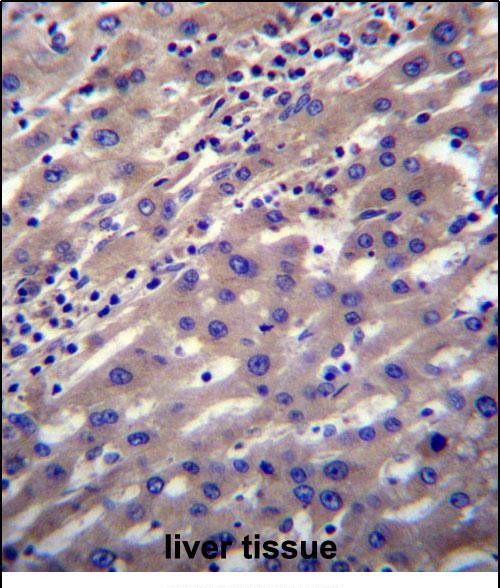SCP2 Antibody (N-term)
Affinity Purified Rabbit Polyclonal Antibody (Pab)
- 产品详情
- 实验流程
- 背景知识
Application
| WB, IHC-P, E |
|---|---|
| Primary Accession | P22307 |
| Other Accession | NP_001007101.1, NP_001007251.1, NP_001007100.1 |
| Reactivity | Human |
| Host | Rabbit |
| Clonality | Polyclonal |
| Isotype | Rabbit IgG |
| Calculated MW | 58994 Da |
| Antigen Region | 14-43 aa |
| Gene ID | 6342 |
|---|---|
| Other Names | Non-specific lipid-transfer protein, NSL-TP, Propanoyl-CoA C-acyltransferase, SCP-chi, SCPX, Sterol carrier protein 2, SCP-2, Sterol carrier protein X, SCP-X, SCP2 |
| Target/Specificity | This SCP2 antibody is generated from rabbits immunized with a KLH conjugated synthetic peptide between 14-43 amino acids from the N-terminal region of human SCP2. |
| Dilution | WB~~1:1000 IHC-P~~1:100~500 E~~Use at an assay dependent concentration. |
| Format | Purified polyclonal antibody supplied in PBS with 0.09% (W/V) sodium azide. This antibody is purified through a protein A column, followed by peptide affinity purification. |
| Storage | Maintain refrigerated at 2-8°C for up to 2 weeks. For long term storage store at -20°C in small aliquots to prevent freeze-thaw cycles. |
| Precautions | SCP2 Antibody (N-term) is for research use only and not for use in diagnostic or therapeutic procedures. |
| Name | SCP2 (HGNC:10606) |
|---|---|
| Function | [Isoform SCPx]: Plays a crucial role in the peroxisomal oxidation of branched-chain fatty acids (PubMed:10706581). Catalyzes the last step of the peroxisomal beta-oxidation of branched chain fatty acids and the side chain of the bile acid intermediates di- and trihydroxycoprostanic acids (DHCA and THCA) (PubMed:10706581). Also active with medium and long straight chain 3-oxoacyl-CoAs. Stimulates the microsomal conversion of 7-dehydrocholesterol to cholesterol and transfers phosphatidylcholine and 7-dehydrocholesterol between membrances, in vitro (By similarity). Isoforms SCP2 and SCPx cooperate in peroxisomal oxidation of certain naturally occurring tetramethyl- branched fatty acyl-CoAs (By similarity). |
| Cellular Location | [Isoform SCP2]: Peroxisome {ECO:0000250|UniProtKB:P32020}. Cytoplasm. Mitochondrion. Endoplasmic reticulum {ECO:0000250|UniProtKB:P32020}. Mitochondrion {ECO:0000250|UniProtKB:P32020} |
| Tissue Location | Liver, fibroblasts, and placenta. |
For Research Use Only. Not For Use In Diagnostic Procedures.
Provided below are standard protocols that you may find useful for product applications.
BACKGROUND
This gene encodes two proteins: sterol carrier protein X (SCPx) and sterol carrier protein 2 (SCP2), as a result of transcription initiation from 2 independently regulated promoters. The transcript initiated from the proximal promoter encodes the longer SCPx protein, and the transcript initiated from the distal promoter encodes the shorter SCP2 protein, with the 2 proteins sharing a common C-terminus. Evidence suggests that the SCPx protein is a peroxisome-associated thiolase that is involved in the oxidation of branched chain fatty acids, while the SCP2 protein is thought to be an intracellular lipid transfer protein. This gene is highly expressed in organs involved in lipid metabolism, and may play a role in Zellweger syndrome, in which cells are deficient in peroxisomes and have impaired bile acid synthesis. Alternative splicing of this gene produces multiple transcript variants, some encoding different isoforms.
REFERENCES
Shimada, M., et al. Hum. Genet. 128(4):433-441(2010)
Bailey, S.D., et al. Diabetes Care 33(10):2250-2253(2010)
Talmud, P.J., et al. Am. J. Hum. Genet. 85(5):628-642(2009)
Rikova, K., et al. Cell 131(6):1190-1203(2007)
Dansen, T.B., et al. J. Lipid Res. 45(1):81-88(2004)
终于等到您。ABCEPTA(百远生物)抗体产品。
点击下方“我要评价 ”按钮提交您的反馈信息,您的反馈和评价是我们最宝贵的财富之一,
我们将在1-3个工作日内处理您的反馈信息。
如有疑问,联系:0512-88856768 tech-china@abcepta.com.























 癌症的基本特征包括细胞增殖、血管生成、迁移、凋亡逃避机制和细胞永生等。找到癌症发生过程中这些通路的关键标记物和对应的抗体用于检测至关重要。
癌症的基本特征包括细胞增殖、血管生成、迁移、凋亡逃避机制和细胞永生等。找到癌症发生过程中这些通路的关键标记物和对应的抗体用于检测至关重要。 为您推荐一个泛素化位点预测神器——泛素化分析工具,可以为您的蛋白的泛素化位点作出预测和评分。
为您推荐一个泛素化位点预测神器——泛素化分析工具,可以为您的蛋白的泛素化位点作出预测和评分。 细胞自噬受体图形绘图工具为你的蛋白的细胞受体结合位点作出预测和评分,识别结合到自噬通路中的蛋白是非常重要的,便于让我们理解自噬在正常生理、病理过程中的作用,如发育、细胞分化、神经退化性疾病、压力条件下、感染和癌症。
细胞自噬受体图形绘图工具为你的蛋白的细胞受体结合位点作出预测和评分,识别结合到自噬通路中的蛋白是非常重要的,便于让我们理解自噬在正常生理、病理过程中的作用,如发育、细胞分化、神经退化性疾病、压力条件下、感染和癌症。







